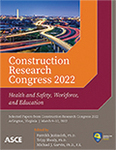Operationalization of Desirable Skill Sets in Novice Construction Professionals
Publication: Construction Research Congress 2022
ABSTRACT
Employability in any field, and especially in construction, is enhanced by the right amount of skill sets, competences, and attributes. However, today there exist notable skill gaps between students’ preparation and industry requirements. This study therefore seeks to address the perceived importance and expectancy gap of skill sets for new entrants in the construction industry to increase their employability. Effects of the backgrounds of both respondents, i.e., professionals and students, on the perceptions of desirable skill sets were also examined. Seventy-two different skill sets, identified through a comprehensive review of literature, were assessed based on responses from a questionnaire survey. Through MANOVA and independent t-test, empirical analysis was conducted to reveal substantial dissimilarities in the perceptions of practitioners and students. However, irrespective of the level of experience and gender, industry practitioners’ responses shown no differences with regards to perceived importance of desirable skill sets. Similarly, regardless of gender, students showed similarities in their responses while examining effects of their backgrounds. The findings are crucial to academic institutions trying to re-examine the development of curricula to incorporate desirable skill sets from the perspectives of students and practitioners. Similarly, the means of imparting the identified desirable skills for enhancing employability in students by academia needs amendment.
Get full access to this article
View all available purchase options and get full access to this chapter.
REFERENCES
Abdelhamid, T. S. (2003). Evaluation of teacher-student learning style disparity in construction management education. Journal of Construction Education, 8(3), 124–145.
Agrawal, N. M., and Thite, M. (2006). Nature and importance of soft skills in software project leaders. Asia Pacific Management Review, 11(2), 93–102.
Ahmed, S. M., Yaris, C., Farooqui, R. U., and Saqib, M. (2014). Key attributes and skills for curriculum improvement for undergraduate construction management programs. International Journal of Construction Education and Research, 10(4), 240–254, DOI: https://doi.org/10.1080/15578771.2014.900833.
Al-Gahtani, S. S., Hubona, G. S., and Wang, J. (2007). Information technology (IT) in Saudi Arabia: Culture and the acceptance and use of IT. Information and Management, 44(8), 681–691.
Carroll, G., and Boutall, T. (2011). Guide to developing national occupational standards.
CIOB (Chartered Institute of Building). (2010), Skills in the Construction Industry, Chartered Institute of Building, Ascot, UK.
Cimatti, B. (2016). Definition, development, assessment of soft skills and their role for the quality of organizations and enterprises. International Journal for Quality Research, 10(1).
CBI (Confederation of British Industry). (2013). Changing the pace: CBI/Pearson education and skills survey 2013.
de Grandbois, Y. (2013). Managerial competencies for information professionals: An international perspective. Library Review, 62(4/5), 335–343.
Dubey, R. S., and Tiwari, V. (2020). Operationalisation of soft skill attributes and determining the existing gap in novice ICT professionals. International Journal of Information Management, 50, 375–386.
Dubey, R. S., Tewari, V., and Pandiya, B. (2017). A soft approach towards gaining employability in IT professionals. December 2017 IEEE International Conference on Industrial Engineering and Engineering Management (IEEM) (pp. 299–303).
Edum-Fotwe, F. T., and McCaffer, R. (2000). Developing project management competency: perspectives from the construction industry. International journal of project management, 18(2), 111–124.
Felstead, A., Gallie, D., Green, F., and Inanc, H. (2013). Skills at work in Britain: First findings from the skills and employment survey 2012.
Gallagher, K. P., Kaiser, K. M., Simon, J. C., Beath, C. M., and Goles, T. (2010). The requisite variety of skills for IT professionals. Communications of the ACM, 53(6), 144–148.
Gupta, R., and Pandit, A. (2010). Entrepreneurial opportunities in Indian talent pool management—A case of merittrac. Asian Journal of Management Cases, 7(2), 113–134.
H.M. Government. (2009). Strategic Government. Working together. London: Government of the United Kingdom.
Hazzan, O., and Har-Shai, G. (2013). Teaching computer science soft skills as soft concepts. March Proceeding of the 44th ACM Technical Symposium on Computer Science Education (pp. 59–64).
Hopkins, M., and Bilimoria, D. (2008). Social and emotional competencies predicting success for male and female executives. Journal of Management Development, 27(1), 13–35.
Jamali, D., Sidani, Y., and Abu-Zaki, D. (2008). Emotional intelligence and management development implications: Insights from the Lebanese context. Journal of Management Development, 27(3), 348–360.
Lee, S. M., and Lee, C. K. (2006). IT managers’ requisite skills. Communications of the ACM, 49(4), 111–114.
Litecky, C. R., Arnett, K. P., and Prabhakar, B. (2004). The paradox of soft skills versus technical skills in IS hiring. Journal of Computer Information Systems, 45(1), 69–76.
Manthe, M., and Smallwood, J. (2007). The appropriateness of built environment tertiary education: Perspectives of academics and postgraduate students. Journal of Engineering, Design and Technology, 5(2), 102–119.
McMurtrey, M. E., Downey, J. P., Zeltmann, S. M., and Friedman, W. H. (2008). Critical skill sets of entry-level IT professionals: An empirical examination of perceptions from field personnel. Journal of Information Technology Education Research, 7, 101–120.
Rawlins, J., and Marasini, R. (2011). Are the construction graduates on CIOB accredited degree courses meeting the skills required by the industry? Management, 167, 174.
Trauth, E. M., Farwell, D. W., and Lee, D. (1993). The IS expectation gap: Industry expectations versus academic preparation. Mis Quarterly, 293–307.
UKCES (UK Commission for Employment and Skills). (2009). The Employability Challenge–Full Report.
Vroom, V. H. (1964). Work and motivation, Vol. 54. New York: Wiley.
WEF (World Economic Forum). (2020). The Future of Jobs Report 2020. Geneva: World Economic Forum.
Information & Authors
Information
Published In
History
Published online: Mar 7, 2022
Authors
Metrics & Citations
Metrics
Citations
Download citation
If you have the appropriate software installed, you can download article citation data to the citation manager of your choice. Simply select your manager software from the list below and click Download.
